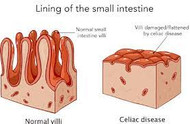Celiac Disease: Your Questions Answered
Posted by DS DC on Feb 16th 2022
Have questions about Celiac disease? OVitaminPro.com is here to help with some of the most frequently asked questions regarding this disorder. Celiac disease (CD) is a subset of gluten sensitivity. The better the testing becomes, the higher the percentage of people that have CD. Don't be surprised at widely varying estimates of how many Americans have CD. It depends on testing procedures. Because we didn't understand how to test, just 30 years ago CD was considered rare or affecting no more than 1 in 5000. Some current researchers say it is as high as 1 in 50 and some say 1 in 100. In the future with better testing, the actual percentage of celiac sufferers diagnosed properly is likely to increase even further.
What is Celiac Disease?
Celiac Disease is classified as an autoimmune disorder with a strong genetic predisposition. Most cases are asymptomatic with respect to the digestive system even with intestinal damage. About 100 disorders have been shown to be associated with gluten sensitivity. See the Gluten Quick Facts Sheet for that list.
What Causes Celiac Disease? Celiac disease is caused by a reaction to proteins that are found in wheat products, as well as in barley and rye. When a Celiac Disease patient is exposed to wheat gluten, the small intestine and the immune system cause an inflammatory reaction and an antibody cascade that interferes with the function of small intestine villi. As a result, the absorption of nutrients is impaired, thus negatively impacting the entire body's health.
Is Celiac Disease the Same as a Wheat Allergy? No. Both Celiac disease and wheat allergies are caused by reactions to wheat proteins and other components of the wheat seed (like wheat germ lectins for example). The allergic reaction and the gluten sensitivity reactions are mediated by entirely different immune mechanisms. Allergies are IgE mediated reactions and are fairly rapid, that is you usually know within seconds or minutes that you are having a reaction. Gluten sensitivity and CD is an IgG and/or IgA mediated reaction and it can take hours or days for the reaction to hit its peak. Therefore it is more difficult to link a gluten sensitivity antibody reaction to the ingested food.
How is Celiac Disease Diagnosed?
It is taking a long time for traditional medicine to get up to speed with the research advances of the last decade. This is probably due to the fact that no medication has been developed to treat any part of GS directly. The chance that your family doctor or even a specialist will pick up an obvious case of CD is only 1%. If your doctor runs a blood test he or she will most likely only test for one or two of the 20 or 30 possible offending protein-stimulated antibodies. Biopsies are sometimes used but they will have to find the damaged section of the small intestine and many times light microscope techniques are not adequate to find all the damage. Scanning electron microscope techniques are far superior but are only used in research settings. As of winter 2011, blood test techniques have become available to quickly and economically test for a full array of antibodies associated with gluten reactions.
How is Celiac Disease Treated?
A gluten-free diet has been shown to effectively reverse damage from dietary gluten in most cases. It should be noted that a restricted gluten diet won't give a gluten sensitive person the desired healing response in most cases. However, some people with gluten sensitivity also supplement their gluten free diet with digestive supplements that can balance intestinal bacteria and enzymes, which can sometimes be affected by CD or other forms of gluten intolerance.
Where Can I Learn More About Celiac Disease?
To learn more about Celiac Disease and gluten sensitivity, you can turn to the following sources:
